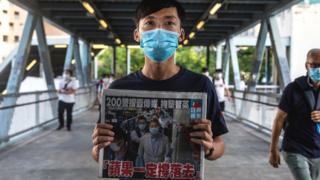 Image copyright
Getty Images
Image copyright
Getty Images
It started off as a local Hong Kong tabloid, known for its sometimes sensational headlines and paparazzi photographs.
But over its 25 years in print, the Apple Daily has become something rarer - a newspaper unafraid to be openly critical of the Chinese state and a standard bearer for the pro-democracy movement in Hong Kong.
And now, a little over a month since China imposed a new national security law on Hong Kong, the Apple Daily has become a target. Police raided the paper's offices on Monday and arrested its owner, Jimmy Lai, and nine others on charges including colluding with foreign forces.
The raid on the newspaper has raised fears of a broader crackdown on media freedom in Hong Kong - and for the future of one of the few papers unafraid to push the boundaries.
Forbidden fruit
Apple Daily was established in 1995 by Mr Lai, reportedly named after the forbidden fruit in the Bible.
"If Eve hadn't bitten the forbidden fruit, there would be no sin, no right and wrong, and of course - no news," Mr Lai told news site the Lianhe Evening News in an earlier interview.
The paper established itself as a tabloid and became known for its sensationalist articles and bold catchy headlines, focusing on crime and entertainment news.
It strayed sometimes into unethical territory. In 1998 it published a report about a Hong Kong man who was photographed soliciting prostitutes on the Chinese mainland shortly after his wife committed suicide.
It was later revealed that a reporter from Apple Daily had paid the man money to pose for the photograph.
But over the years the paper evolved and started to cover more political news. Hong Kong began experiencing a series of social movements in the early 2000s which saw people resisting integration with the mainland.
That resistance opened up the market of political news for Apple Daily, according to Dr Joyce Nip, a senior lecturer in Chinese media studies at the University of Sydney, and gave the paper a unique advantage when other mainstream news outlets began "toeing the line of [one country, two systems]".
"Apple Daily generally disapproves of the Beijing political system, mainland China and its appointed administration in Hong Kong, both in its news agenda and in its [framing] of the news," said Dr Nip.
And while the paper continued to cover soft news and entertainment, it increasingly produced political pieces and cemented its position as an unapologetically pro-democracy paper.
On 1 July 2003, the anniversary of Hong Kong's return to China from British rule, a large-scale rally had been organised against the administration of the then Chief Executive, Tung Chee-hwa. Apple Daily was vocal in its support for the movement, printing the words "No to Tung Chee-hwa" in its headline.
The paper's reporters are typically barred from covering news in mainland China and none were permitted to cover the 2008 Beijing Olympic Games.
In 2011, when Chinese dissident artist Ai Weiwei was arrested by Beijing authorities, Apple Daily's headline declared: "Beijing politics rapes Ai Weiwei."
In 2019, Apple Daily won the Hong Kong Human Rights Press Award for its reporting on Liu Xia, the wife of the prominent Chinese human rights activist Liu Xiaobo, who died while serving an 11-year sentence for "subversion".
The paper's criticism of the Chinese government and pro-establishment figures in Hong Kong reportedly resulted in frequent advertising boycotts.
'Kill the chicken to scare the monkey'
And then, this week, the paper saw the arrest of its own founder, Mr Lai, and a handful of other media figures and activists, under the sweeping new security law passed by China in June.
"The sight of more than a hundred police men raiding the newsroom was really shocking," said Professor Keith Richburg, the director of the Journalism and Media Studies Centre at the University of Hong Kong.
"I think it was entirely intended to scare [other media outlets]. In Chinese there's a saying, 'Kill the chicken to scare the monkey'. Apple Daily in this case was the chicken and we are the monkeys. It was a very dramatic show of force," he said.
But even now, the paper is not holding back.
In Tuesday's edition it doubled down on its criticism, accusing the police of "blatantly bypass[ing] the law and abusing their power" during the raid of its offices.
It is not clear now what lies ahead for the paper.
Mr Lai's arrest, together with that of the paper's senior editors, "takes away leadership of the paper, which will create difficulty for its operation", said Dr Nip. But she said she thought the paper would continue to operate.
It is certainly not backing down yet.
"Hong Kong's press freedom is now hanging by a thread, but our staff will remain fully committed to our duty to defend the freedom of the press," the paper said in a statement.
"Apple Daily shall fight on."